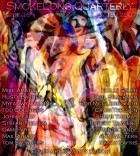On a vacation, I encountered a man from Glasgow who discussed the renovation of the cottage in which I was staying. He spoke with the drama of Ahab raging against the white whale: “We gave it a wee bit squint, but that wall, the men lost heart but pushed on….” It made me wonder what life is like when everything has such drama and intensity—and from where did such drama come?
That would be the bleak Calvinist upbringing. I was just this moment outside damning a recalcitrant snow shovel myself. You rail against the existential absurdities, and when you’re Scottish they’re especially acute, but your vocabulary is always that religious one drilled into you from childhood. There’s dramatic intensity for you. A Glaswegian has no problem understanding Melville, and deep down suspects the white whale has an English accent. Emerson might as well be from Mars though.
The tension between the “lullaby” of the title and the story itself creates a wonderful effect. When did you realize you would be writing a lullaby?
My father used to sing “Irish Lullaby” to me when I was a baby. Too-ra-loo-ra-loo-ral. He only did it when he’d been drinking and had turned sentimental and he’d just bawl the words. It was all very terrifying to me. I suppose lullaby and nightmare are synonymous now.
How did this dialect get in your head—and how were you able to translate it so masterfully onto the page?
The West of Scotland demotic is in my head because I grew up there. I’ll never lose it now. It’s the sound of my thoughts and my deep hidden aggressions and is a terrible inconvenience. Writers like Tom Leonard and James Kelman showed how to put it on the page.
And Hangin’ Dragon! From what depths of the unconscious was he born?
Well, my own unconscious is a dank place I don’t care to linger. But the story of the new hangman is actually sort of true. And there was a Dreghorn looked something like that, although he was never a Provost. There was even a dancing bear I think. Maybe I made the bear up. Anyway, the historical legends have been twisted and conflated and confused in the narrator’s head. You can always count on Glasgow history being weirder than anyone’s unconscious.
At the recent AWP conference, a number of writers talked about their old flames, books that have influenced them during a formative time in their lives—and ones they return to for lessons in writing and, of course, life. Discuss your old flame, both what it meant to you then and what it means to you now.
When I was in my teens, I read Flann O’Brien’s The Third Policeman, and it made a huge impression. Not as an influence, for that is one inimitable writer, but as a wonderful test case. I always recommend the book to others and, if they don’t like it, I have cause to doubt them (in the same way I’m suspicious of people who read Beckett and don’t find him hysterically funny). I suppose that’s the bleak Celt in me. I reread The Third Policeman (and At-Swim-Two-Birds) every couple of years, sometimes when I’m traveling and in a hotel room, which makes our relationship still an ongoing fling as far as I’m concerned.


